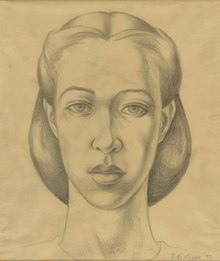Phyllis de Lappe, also known as Pele de Lappe or Pele deLappe (1916–2007)[1][2] was an American artist, known for her social realist paintings, prints, and drawings. She also worked as a journalist, newspaper editor, illustrator, and political cartoonist. de Lappe had been a resident for many years in Berkeley, California and later, Petaluma, California.
Pele de Lappe | |
|---|---|
 Self-Portrait, 1938 | |
| Born | Phyllis deLappe May 4, 1916 San Francisco, California, U.S. |
| Died | October 1, 2007 (aged 91) Petaluma, California, U.S. |
| Other names | Pele deLappe, Phyllis Murdock, Phyllis Edises, Pele Edises |
| Education | San Francisco Art Institute, Art Students League of New York |
| Years active | 1930–2007 |
| Known for | Paintings, Prints, Political Cartoons |
| Movement | California Labor School, Communist Party USA |
| Spouse(s) | Bert Edises (1934–1949), Steve Murdock (1953–1969) |
| Partner | Byron Randall (c.1990s–1999) |
| Children | 2 |
Early life and education
editShe was born as Phyllis deLappe on May 4, 1916 in San Francisco, California and was the fourth-generation of her family born in San Franciscan.[3][2] Her father, Wes deLappe was a commercial artist and her mother was Dorothy Sheldon deLappe.[4][5][6]
She started her career as an artist at age 14, studying art at California School of Fine Arts (now San Francisco Art Institute) under Arnold Blanch.[2][7] Two years later she continued education at Art Students League of New York, working with artists Edward Lansing, Kenneth Hayes Miller, John Sloan and Charles Locke.[3][4][7] While in New York, she befriended artists Frida Kahlo and Diego Rivera in the 1930s.[8] This was during Rivera's Rockefeller Center mural, Man at the Crossroads and de Lappe modeled and assisted on the mural.[8]
Career
editBy 1934, she returned to San Francisco, joined the Communist party and became active in the labor movement.[5] She taught figure drawing at the California Labor School during the 1940s.[5] She also worked in the 1940s as an editor and political cartoonist for The People's World, a labor movement newspaper.[7] She additionally worked as an illustrator for other newspapers, including: Daily Worker, The New Masses, L'Unita Operaia, West Oakland Beacon, and the San Francisco Chronicle.[7]
In 1952, de Lappe alongside several artists from the California Labor School went on and founded the Graphic Arts Workshop (GAW), a cooperative printmaking studio in San Francisco.[5][7][9]
In 1999, she published her autobiography, Pele: A Passionate Journey through Art and the Red Press.[6][10]
Her artwork is in many public collections, including: National Gallery of Art,[11] the Smithsonian Institution's National Portrait Gallery,[12][13] Fine Art Museums of San Francisco (FAMSF),[1] Syracuse University, and the Library of Congress.[14][7]
Personal life
editIn 1934, she married lawyer, Bertram "Bert" Edises and together they had two children. The couple divorced in 1949.[5] She was married from 1953 until 1969 to Steve Murdock, a writer for People's World the labor movement newspaper.[5]
She moved to Petaluma in the 1990 to be closer to her friend and longtime partner, artist Byron Randall and this romance lasted until his death in 1999.[6][15]
References
edit- ^ a b "Pele de Lappe". FAMSF Search the Collections. 2018-09-21. Retrieved 2024-01-16.
- ^ a b c Scherr, Judith (October 16, 2007). "Pele deLappe, Artist and Activist, Remembered—1916-2007". The Berkeley Daily Planet. Retrieved 2019-06-03.
- ^ a b "Artist Biography for Phyllis (Pele) De Lappe". www.askart.com. Retrieved 2019-06-03.
- ^ a b Curiel, Jonathan (2007-10-04). "Pele deLappe – artist, journalist, rights activist dead at 91". SFGate. Retrieved 2019-06-03.
- ^ a b c d e f "Pele deLappe Papers". oac.cdlib.org. Online Archive of California, California Digital Library. Retrieved 2019-06-03.
- ^ a b c Giles, Gretchen (2002-09-12). "Pele deLappe". Metroactive Arts. North Bay Bohemian. Retrieved 2019-06-03.
- ^ a b c d e f "Pele de Lappe". The Graphic Arts Workshop. Retrieved 2019-06-03.
- ^ a b "Extraordinary California Women Artists Working from 1860 to 1960". Hyperallergic. 2019-02-20. Retrieved 2019-06-04.
- ^ Hamlin, Jesse (2002-11-25). "The Graphic Arts Workshop presses forward / S.F. artists group works for social justice". SFGate. Retrieved 2019-06-05.
- ^ Wasp, Jean (2002). "News Center: "A Passionate Journey: The Works of Pele deLappe" Kicks Off the University Library Fall Programs". Sonoma State University (SSU) News Center. Retrieved 2024-01-16.
- ^ "Phyllis (Pele) De Lappe". www.nga.gov. Retrieved 2019-06-03.
- ^ "Self-Portrait (On Being Female)". npg.si.edu. Retrieved 2019-06-24.
- ^ "Pele de Lappe Self-Portrait". npg.si.edu. Retrieved 2019-06-24.
- ^ "Collection: The Jelly-Roll blues by Pele DeLappe (1939)". www.loc.gov. Retrieved 2019-06-03.
- ^ "Byron Randall". SFGate. 1999-08-19. Retrieved 2019-06-03.
External links
edit- images of de Lappe's work on Fine Arts Museums of San Francisco
- Subway, 1932 at the National Gallery of Art
- Video: "Meeting Frieda Kahlo and Diego Rivera", Pele De Lappe describes meeting the artists, video by Chris Carlsson from 2001 on Archive.org